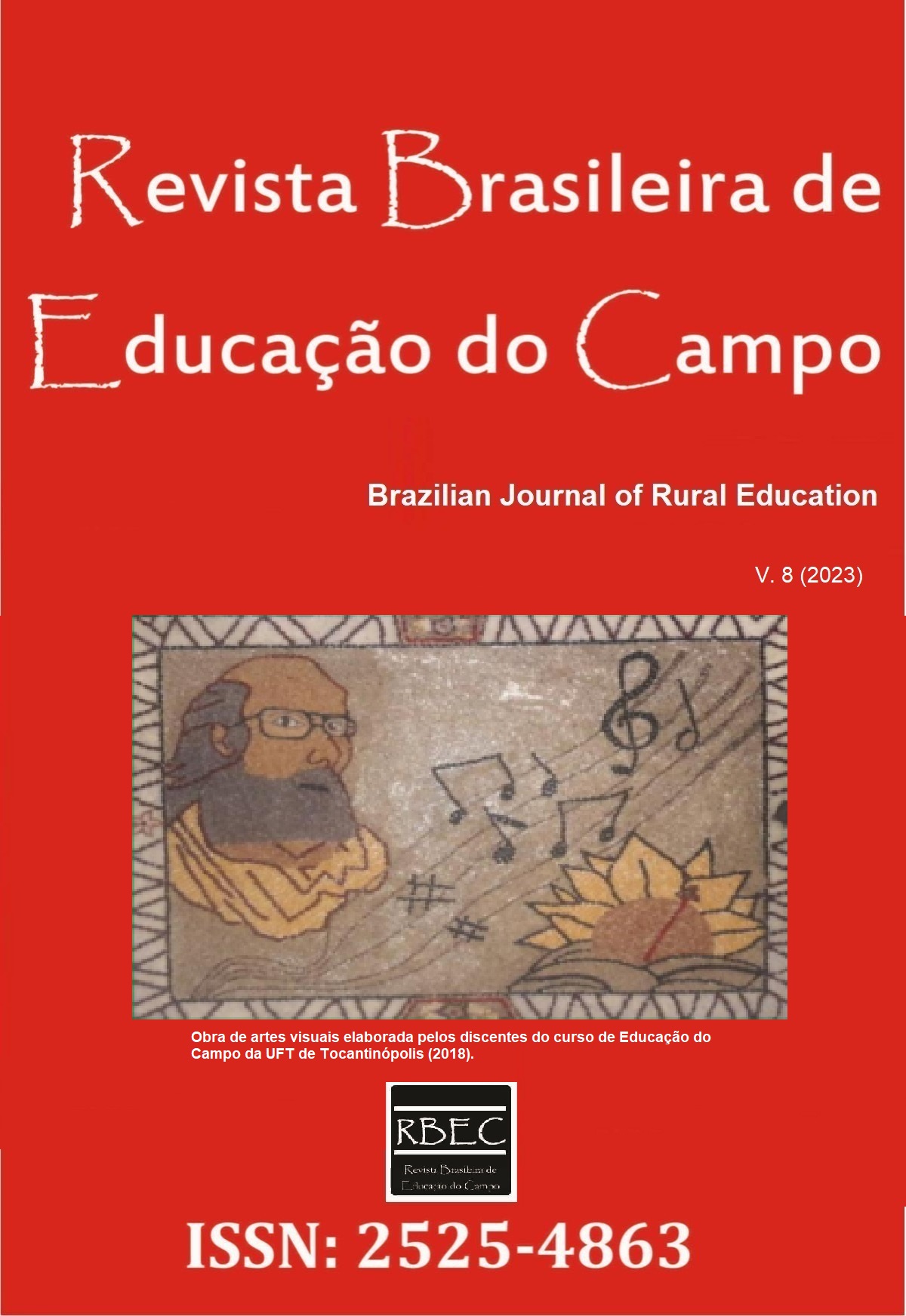Thinking about Artes in Early Childhood Education: a look from the teaching point of view in two educational institutions in Tocantinópolis-TO
DOI:
https://doi.org/10.20873/uft.rbec.e15631Abstract
ABSTRACT. Thinking about the importance of teaching the Arts in Early Childhood Education, this research debates the understanding of teachers who work with this stage of Basic Education about the Arts and its importance in the teaching and learning process of young children. Therefore, the research was carried out in two school units in the city of Tocantinópolis. The methodological contribution used in this work is qualitative research, with the use of interviews and support of Cultural History for analysis of information. We interviewed four teachers from the city of Tocantinópolis who work in two schools of early childhood education, in the two modalities of early childhood education: daycare and preschool. The research shows the lack of training in Arts by the teachers who work at this stage, as well as the predominance of work with the Visual Arts at the expense of other artistic languages: Theater, Dance and Music. In addition, it is possible to realize that although teachers do not have training in Arts, they have shown to enjoy working with the area and value the importance of Arts in the lives of children, as well as their teaching potential in Early Childhood Education.
Downloads
References
Amaral, C. S. (2011). John Ruskin e o ensino do desenho no Brasil. São Paulo, SP: Editora UNESP.
Araújo, G. C. (2014). O Ensino de Arte na Educação de Jovens e Adultos: uma experiência em Cuiabá (Dissertação de Mestrado). Universidade Federal de Mato Grosso, Cuiabá.
Araújo, G. C., Oliveira, S. B., & Almeida, L. S. (2019). A formação do professor de Arte em Tocantins: Velhos desafios e problemas na educação brasileira. Laplage em Revista, 5(2), 176-189.
Barros, J. D. (2005). A História Cultural e a Contribuição de Roger Chartier. Diálogos, 9(1). 125-141.
Chartier, R. (1990). A História Cultural: entre práticas e representações. Lisboa: DIFEL.
Gil, A. C. (2008). Métodos e técnicas de pesquisa social. São Paulo: Atlas.
Barbosa, A. M. (1988). Tópicos Utópicos. Belo Horizonte: C/Arte.
Barbosa, A. M. (2003). O Ensino da Arte no Brasil nos inícios do século XXI. Aprender.
Bogdan, R., & Birklen, S. K. (1982). Investigação qualitativa em educação. São Paulo: Atlas.
Brasil. (2016). Constituição da República Federativa do Brasil de 1988. Brasília, DF: Presidência da República.
Brasil. (1996). Diretrizes para a Política Nacional de Educação Escolar. 2.ed. Brasília: MEC/ SEF/DPEF.
Brasil. Ministério da Educação e do Desporto. Secretaria de Educação Fundamental. (1998). Referencial Curricular Nacional para Educação Infantil.
Brasil. Ministério da Educação. (2009) Diretrizes Curriculares Nacionais para a Educação Infantil. Resolução CNE/CEB 5.
Brasil. Ministério da Educação e Cultura. (2017). Base Nacional Comum Curricular. Educação Infantil e Ensino Fundamental.
Costa, C. A. (2020). Um olhar reflexivo acerca da Arte na Educação Infantil na Escola Municipal Manoel de Sousa Lima (Tocantinópolis-TO) (Monografia de Graduação). Universidade Federal do Tocantins, Tocantinópolis.
Marques, I., & Brazil, F. (2014). Arte em questões. São Paulo: Cortez.
Mendes, R. P. (2013). A Formação Continuada na Educação Infantil e sua repercussão na prática docente (Dissertação de Mestrado). Universidade do Estado de Mato Grosso, Cáceres.
Neves, J. L. (1996). Pesquisa qualitativa: características, usos e possibilidades. Caderno de Pesquisas em Administração, 1(3), 1-5.
Oliveira, R. R. A., & Teixeira, B. B. (2014). Acesso à educação infantil: desafios à política municipal e a exigibilidade de seu direito. In Anais IV Congresso Ibero-Americano de Política e Administração da Educação / VII Congresso Luso Brasileiro de Política e Administração da Educação. Porto, Portugal.
Santos, J. B., & Sousa Junior, L. (2021). Os Recursos Direcionados às Crianças de 0 a 5 Anos de Idade no Contexto do Fundeb em João Pessoa/PB. FINEDUCA-Revista de Financiamento da Educação, 11.
UFT. (s.d). Tocantinópolis. Município. Campus de Tocantinópolis. Universidade Federal do Tocantins.
Published
How to Cite
Issue
Section
License
Copyright (c) 2023 Gracilene dos Santos, Cassia Ferreira Miranda

This work is licensed under a Creative Commons Attribution 4.0 International License.
Proposal for Copyright Notice Creative Commons
1. Policy Proposal to Open Access Journals
Authors who publish with this journal agree to the following terms:
A. Authors retain copyright and grant the journal right of first publication with the work simultaneously licensed under the Creative Commons Attribution License that allows sharing the work with recognition of its initial publication in this journal.
B. Authors are able to take on additional contracts separately, non-exclusive distribution of the version of the paper published in this journal (ex .: publish in institutional repository or as a book), with an acknowledgment of its initial publication in this journal.
C. Authors are permitted and encouraged to post their work online (eg .: in institutional repositories or on their website) at any point before or during the editorial process, as it can lead to productive exchanges, as well as increase the impact and the citation of published work (See the Effect of Open Access).















